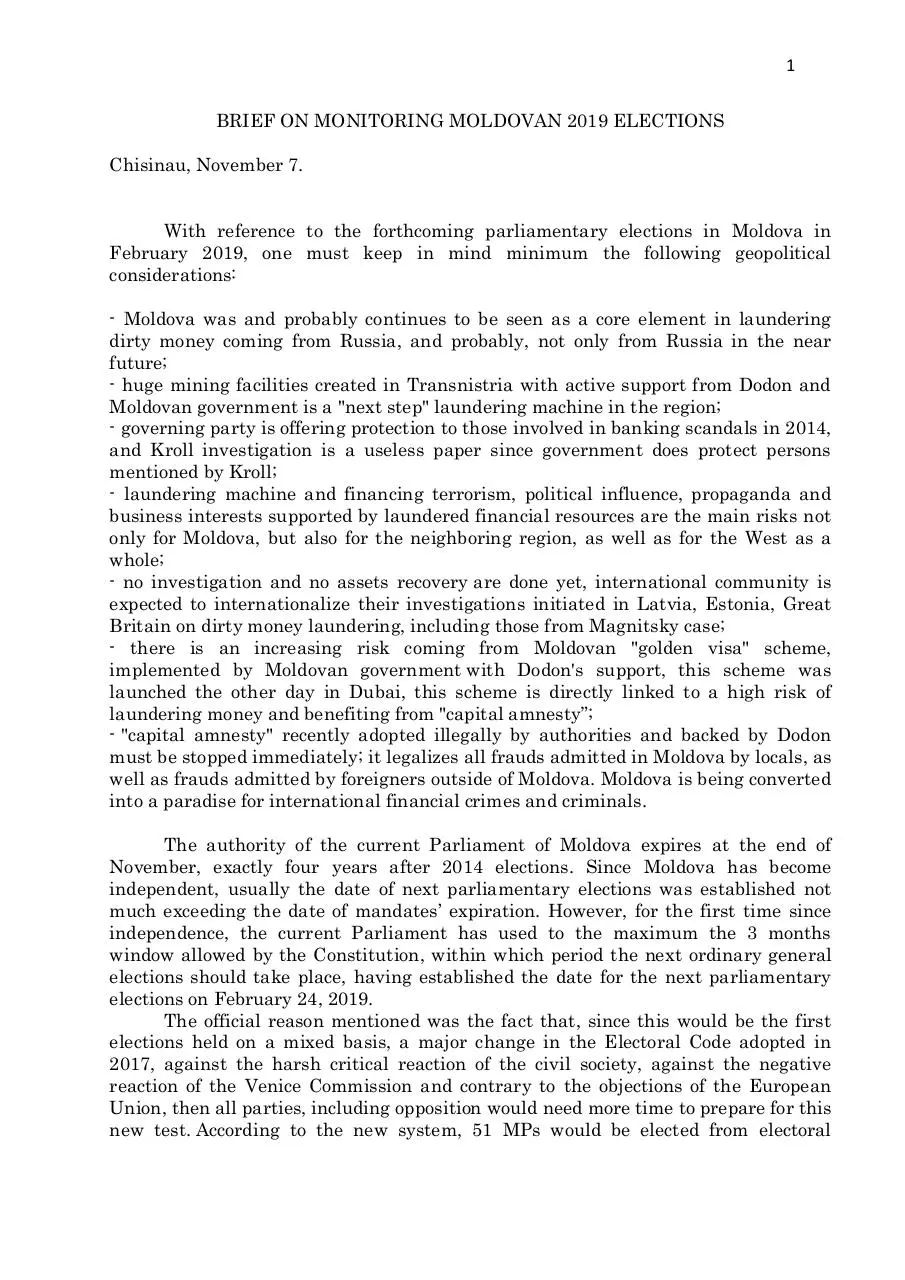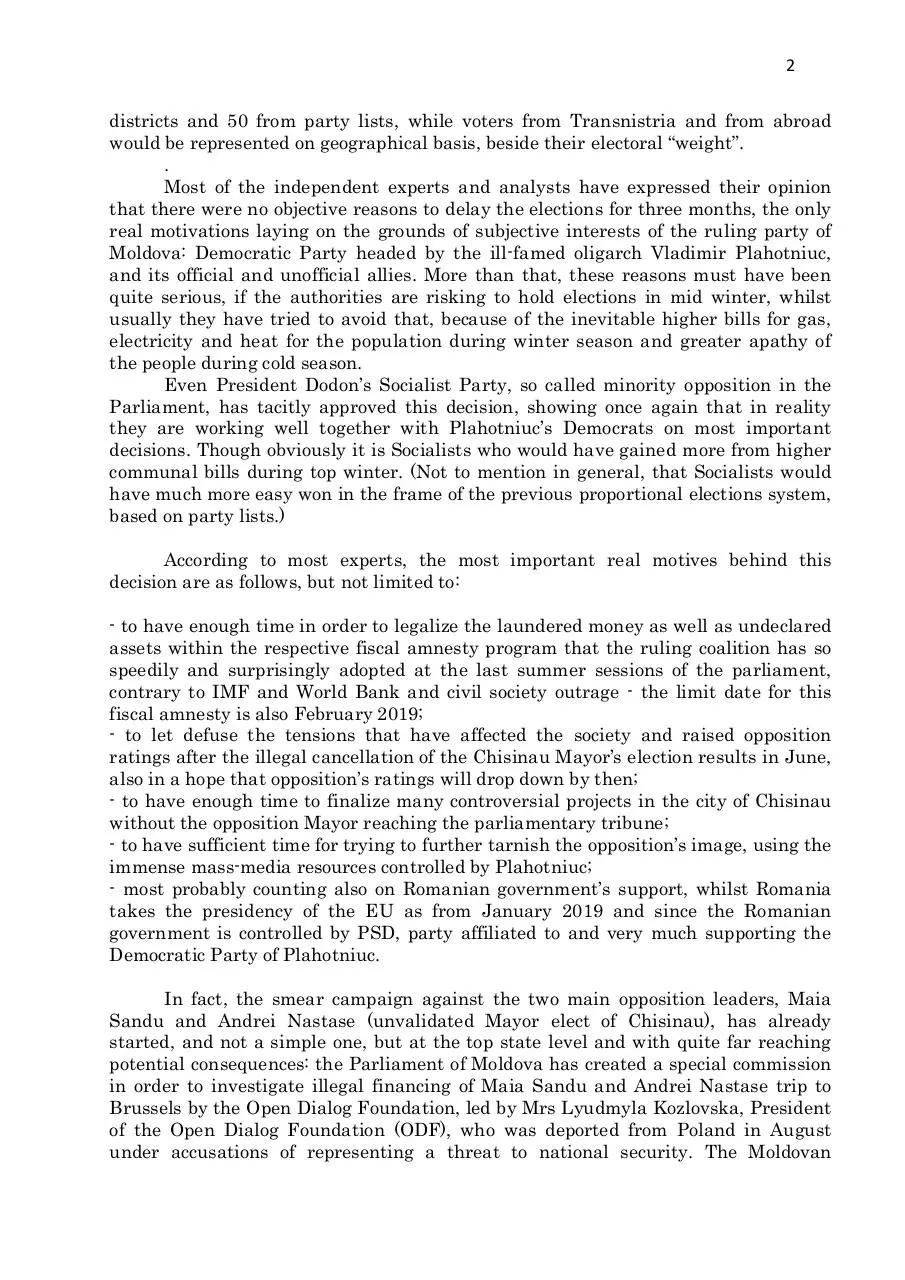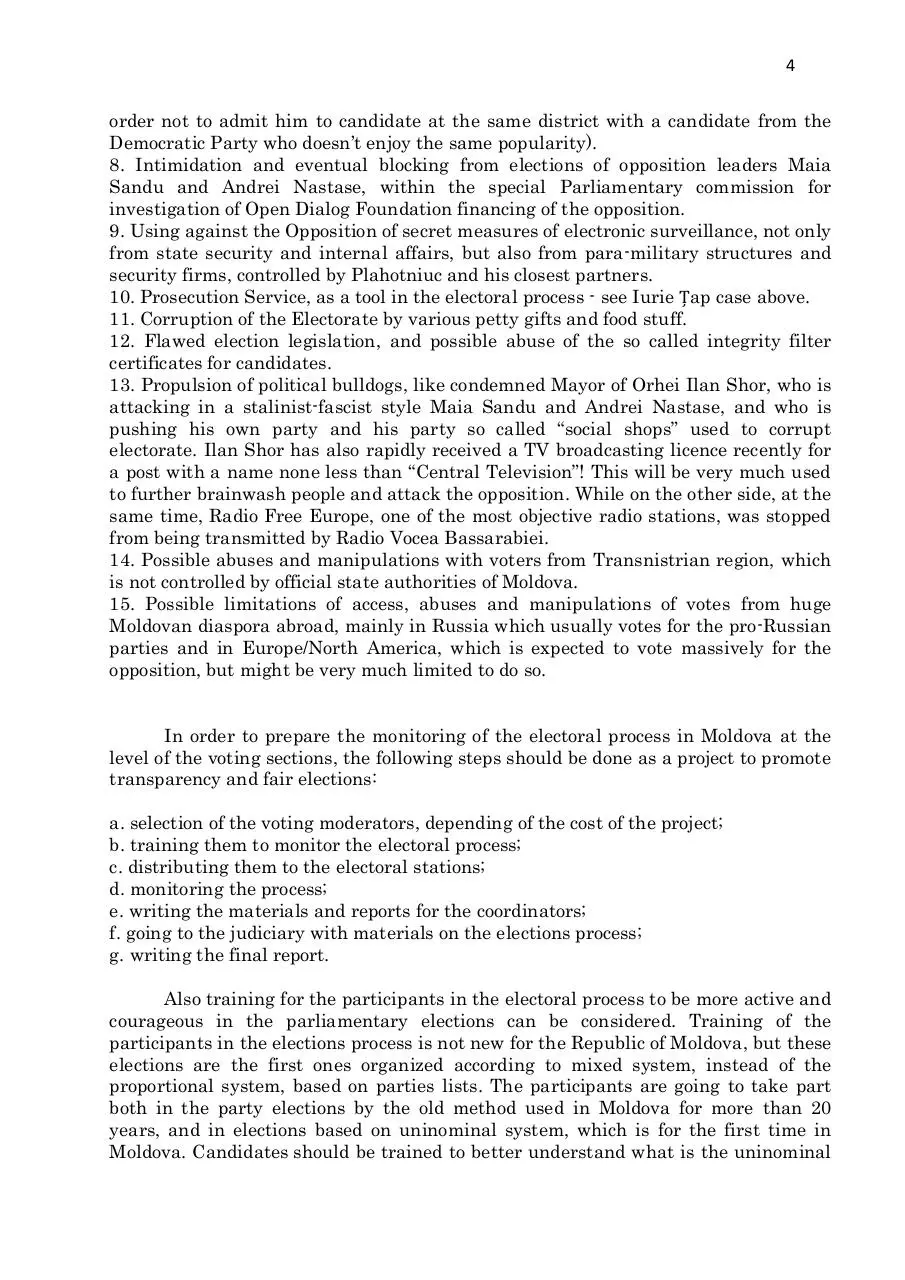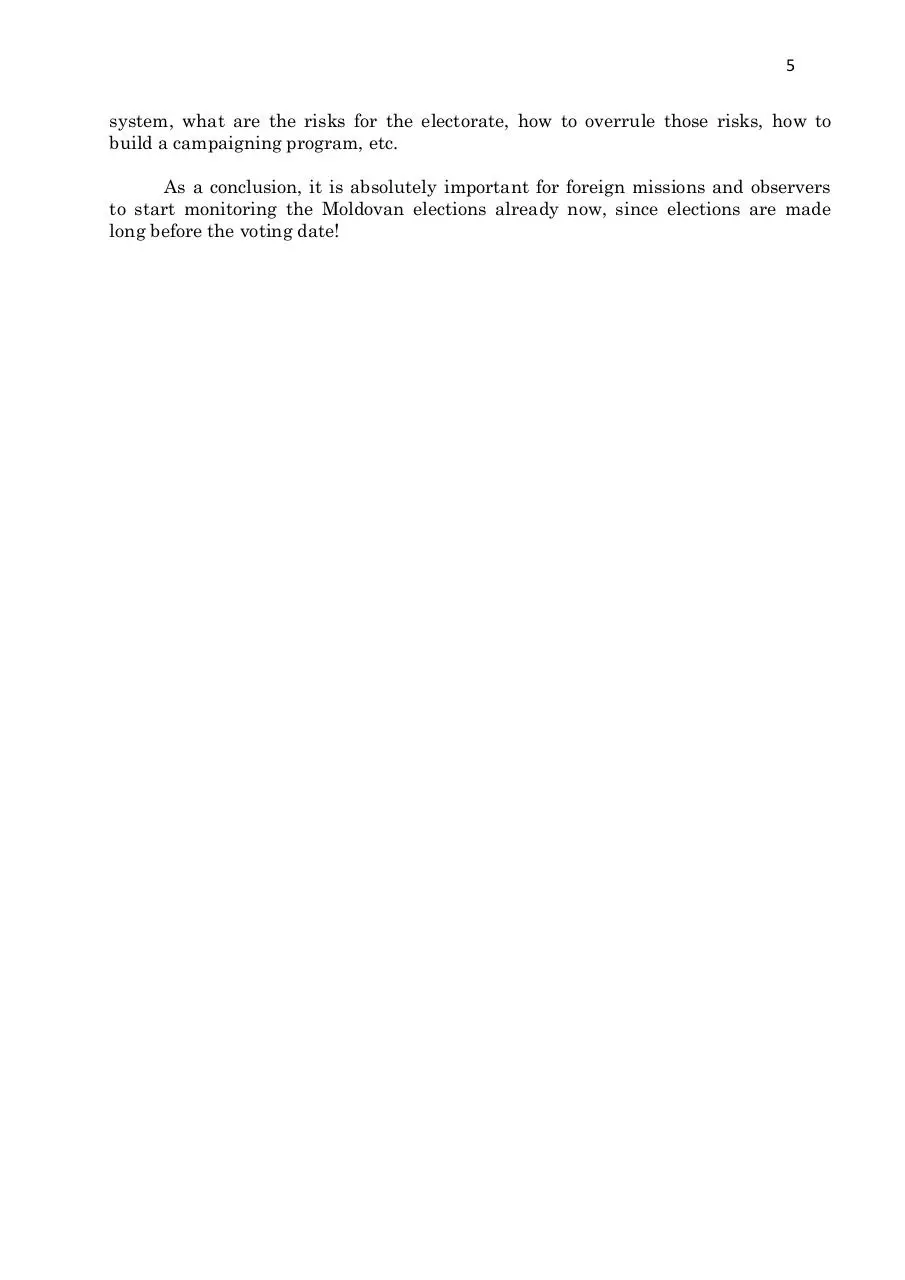Brief on MD elections 2019 (artur) (PDF)
File information
This PDF 1.5 document has been generated by , and has been sent on pdf-archive.com on 28/12/2018 at 11:37, from IP address 2.139.x.x.
The current document download page has been viewed 1516 times.
File size: 231.39 KB (5 pages).
Privacy: public file





File preview
1
BRIEF ON MONITORING MOLDOVAN 2019 ELECTIONS
Chisinau, November 7.
With reference to the forthcoming parliamentary elections in Moldova in
February 2019, one must keep in mind minimum the following geopolitical
considerations:
- Moldova was and probably continues to be seen as a core element in laundering
dirty money coming from Russia, and probably, not only from Russia in the near
future;
- huge mining facilities created in Transnistria with active support from Dodon and
Moldovan government is a "next step" laundering machine in the region;
- governing party is offering protection to those involved in banking scandals in 2014,
and Kroll investigation is a useless paper since government does protect persons
mentioned by Kroll;
- laundering machine and financing terrorism, political influence, propaganda and
business interests supported by laundered financial resources are the main risks not
only for Moldova, but also for the neighboring region, as well as for the West as a
whole;
- no investigation and no assets recovery are done yet, international community is
expected to internationalize their investigations initiated in Latvia, Estonia, Great
Britain on dirty money laundering, including those from Magnitsky case;
- there is an increasing risk coming from Moldovan "golden visa" scheme,
implemented by Moldovan government with Dodon's support, this scheme was
launched the other day in Dubai, this scheme is directly linked to a high risk of
laundering money and benefiting from "capital amnesty”;
- "capital amnesty" recently adopted illegally by authorities and backed by Dodon
must be stopped immediately; it legalizes all frauds admitted in Moldova by locals, as
well as frauds admitted by foreigners outside of Moldova. Moldova is being converted
into a paradise for international financial crimes and criminals.
The authority of the current Parliament of Moldova expires at the end of
November, exactly four years after 2014 elections. Since Moldova has become
independent, usually the date of next parliamentary elections was established not
much exceeding the date of mandates’ expiration. However, for the first time since
independence, the current Parliament has used to the maximum the 3 months
window allowed by the Constitution, within which period the next ordinary general
elections should take place, having established the date for the next parliamentary
elections on February 24, 2019.
The official reason mentioned was the fact that, since this would be the first
elections held on a mixed basis, a major change in the Electoral Code adopted in
2017, against the harsh critical reaction of the civil society, against the negative
reaction of the Venice Commission and contrary to the objections of the European
Union, then all parties, including opposition would need more time to prepare for this
new test. According to the new system, 51 MPs would be elected from electoral
2
districts and 50 from party lists, while voters from Transnistria and from abroad
would be represented on geographical basis, beside their electoral “weight”.
.
Most of the independent experts and analysts have expressed their opinion
that there were no objective reasons to delay the elections for three months, the only
real motivations laying on the grounds of subjective interests of the ruling party of
Moldova: Democratic Party headed by the ill-famed oligarch Vladimir Plahotniuc,
and its official and unofficial allies. More than that, these reasons must have been
quite serious, if the authorities are risking to hold elections in mid winter, whilst
usually they have tried to avoid that, because of the inevitable higher bills for gas,
electricity and heat for the population during winter season and greater apathy of
the people during cold season.
Even President Dodon’s Socialist Party, so called minority opposition in the
Parliament, has tacitly approved this decision, showing once again that in reality
they are working well together with Plahotniuc’s Democrats on most important
decisions. Though obviously it is Socialists who would have gained more from higher
communal bills during top winter. (Not to mention in general, that Socialists would
have much more easy won in the frame of the previous proportional elections system,
based on party lists.)
According to most experts, the most important real motives behind this
decision are as follows, but not limited to:
- to have enough time in order to legalize the laundered money as well as undeclared
assets within the respective fiscal amnesty program that the ruling coalition has so
speedily and surprisingly adopted at the last summer sessions of the parliament,
contrary to IMF and World Bank and civil society outrage - the limit date for this
fiscal amnesty is also February 2019;
- to let defuse the tensions that have affected the society and raised opposition
ratings after the illegal cancellation of the Chisinau Mayor’s election results in June,
also in a hope that opposition’s ratings will drop down by then;
- to have enough time to finalize many controversial projects in the city of Chisinau
without the opposition Mayor reaching the parliamentary tribune;
- to have sufficient time for trying to further tarnish the opposition’s image, using the
immense mass-media resources controlled by Plahotniuc;
- most probably counting also on Romanian government’s support, whilst Romania
takes the presidency of the EU as from January 2019 and since the Romanian
government is controlled by PSD, party affiliated to and very much supporting the
Democratic Party of Plahotniuc.
In fact, the smear campaign against the two main opposition leaders, Maia
Sandu and Andrei Nastase (unvalidated Mayor elect of Chisinau), has already
started, and not a simple one, but at the top state level and with quite far reaching
potential consequences: the Parliament of Moldova has created a special commission
in order to investigate illegal financing of Maia Sandu and Andrei Nastase trip to
Brussels by the Open Dialog Foundation, led by Mrs Lyudmyla Kozlovska, President
of the Open Dialog Foundation (ODF), who was deported from Poland in August
under accusations of representing a threat to national security. The Moldovan
3
authorities proclaim that Open Dialog is sponsored by Kremlin and that is why Maia
Sandu and Andrei Nastase are basically Russian agents. There were declarations
from some politicians that Plahotniuc will do whatever possible and impossible (read
illegal!) in order not to admit Nastase to take part in the elections.
Here is worth reminding that in 2014 four days before the elections the “Our
Party” of Renato Usatîi, quite a charismatic figure at that time who would have
attracted a lot of votes and mandates, was excluded under accusations of illegal
funding from abroad. Later this accusation was recognized as false by the courts, but
it was too late, obviously. Dodon at that time has got most of the votes from the
excluded Renato Usatîi, confirming strong suspicions that Plahotniuc in fact very
mush supported Dodon for presidency.
The country’s judicial system totally controlled by Plahotniuc is serving well
the regime and is expected to play a major role in the forthcoming elections, having
passed a test after invalidating the Mayor’s elections in Chisinau under ridiculous
pretexts.
In this context it is worth mentioning the Watchdog Moldova appeal to the
courts in 2017 about the illegal foreign funding of Dodon’s election during
presidential campaign in 2016, see this link: https://watchdog.md/2018/08/22/russianoff-shore-funding-of-igor-dodons-electoral-campaign/
While submitting the criminal complaint in October 2017, Watchdog Moldova
has presented plenty of evidences, however nothing has been done by the courts so
far, once again pointing out to double standards of the Moldovan judiciary,
lawlessness and complicity of state authorities in protecting Dodon’s illegal funding,
and underlining the protection offered to Dodon/Greceanii by Plahotniuc and
Democrats, who control the judiciary.
Since the governing Democratic Party wants to stay in power for the next four
years at any price, and the change in the political system of the country by
introducing the mixed system of electing the members of the Parliament is
considered to be a DP's tool to control the elections, monitoring the parliamentary
elections in Moldova on February 24, 2019 is of crucial importance, and this
monitoring should start ASAP, by undertaking the following minimum actions:
The main points of reference within monitoring the elections in Moldova on a
national level are as follows, but not limited to:
1. High degree of monopolization of media by mafia-type structures, whilst roughly
80% of the mass media is controlled by Plahotniuc and Dodon. And basically total
control by Plahotniuc of the revenues coming from advertising on TV.
2. Corruption of journalists, working for the State-owned broadcasting company.
3. Corruption of certain representatives of civil society and political analysts.
4. Politically motivated Central Election Commission, which is not trust-worthy.
5. Lack of real judicial independence.
6. Involvement of the Judiciary in political processes and in the elections.
7. Intimidation of representatives of the Opposition, including initiation of criminal
proceedings against the most active members of the Opposition (R. Verbitski, Gh.
Petic etc. Iurie Țap from LDPM has got a criminal dossier from the year 2000! in
4
order not to admit him to candidate at the same district with a candidate from the
Democratic Party who doesn’t enjoy the same popularity).
8. Intimidation and eventual blocking from elections of opposition leaders Maia
Sandu and Andrei Nastase, within the special Parliamentary commission for
investigation of Open Dialog Foundation financing of the opposition.
9. Using against the Opposition of secret measures of electronic surveillance, not only
from state security and internal affairs, but also from para-military structures and
security firms, controlled by Plahotniuc and his closest partners.
10. Prosecution Service, as a tool in the electoral process - see Iurie Țap case above.
11. Corruption of the Electorate by various petty gifts and food stuff.
12. Flawed election legislation, and possible abuse of the so called integrity filter
certificates for candidates.
13. Propulsion of political bulldogs, like condemned Mayor of Orhei Ilan Shor, who is
attacking in a stalinist-fascist style Maia Sandu and Andrei Nastase, and who is
pushing his own party and his party so called “social shops” used to corrupt
electorate. Ilan Shor has also rapidly received a TV broadcasting licence recently for
a post with a name none less than “Central Television”! This will be very much used
to further brainwash people and attack the opposition. While on the other side, at the
same time, Radio Free Europe, one of the most objective radio stations, was stopped
from being transmitted by Radio Vocea Bassarabiei.
14. Possible abuses and manipulations with voters from Transnistrian region, which
is not controlled by official state authorities of Moldova.
15. Possible limitations of access, abuses and manipulations of votes from huge
Moldovan diaspora abroad, mainly in Russia which usually votes for the pro-Russian
parties and in Europe/North America, which is expected to vote massively for the
opposition, but might be very much limited to do so.
In order to prepare the monitoring of the electoral process in Moldova at the
level of the voting sections, the following steps should be done as a project to promote
transparency and fair elections:
a. selection of the voting moderators, depending of the cost of the project;
b. training them to monitor the electoral process;
c. distributing them to the electoral stations;
d. monitoring the process;
e. writing the materials and reports for the coordinators;
f. going to the judiciary with materials on the elections process;
g. writing the final report.
Also training for the participants in the electoral process to be more active and
courageous in the parliamentary elections can be considered. Training of the
participants in the elections process is not new for the Republic of Moldova, but these
elections are the first ones organized according to mixed system, instead of the
proportional system, based on parties lists. The participants are going to take part
both in the party elections by the old method used in Moldova for more than 20
years, and in elections based on uninominal system, which is for the first time in
Moldova. Candidates should be trained to better understand what is the uninominal
5
system, what are the risks for the electorate, how to overrule those risks, how to
build a campaigning program, etc.
As a conclusion, it is absolutely important for foreign missions and observers
to start monitoring the Moldovan elections already now, since elections are made
long before the voting date!
Download Brief on MD elections 2019 (artur)
Brief on MD elections 2019 (artur).pdf (PDF, 231.39 KB)
Download PDF
Share this file on social networks
Link to this page
Permanent link
Use the permanent link to the download page to share your document on Facebook, Twitter, LinkedIn, or directly with a contact by e-Mail, Messenger, Whatsapp, Line..
Short link
Use the short link to share your document on Twitter or by text message (SMS)
HTML Code
Copy the following HTML code to share your document on a Website or Blog
QR Code to this page

This file has been shared publicly by a user of PDF Archive.
Document ID: 0001904079.